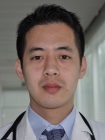Ho Namkoong
Keio University School of Medicine, Tokyo, Japan
APSR Awardee to attend the ATS International Conference 2019 – post-session report

At the 2019 ATS meeting, I was very honoured and grateful to receive the APSR Travel Award. My abstract was accepted for presentation at the 2019 ATS International Conference at the Mini Symposium.
My research is about host susceptibility to pulmonary nontuberculous mycobacteria (NTM) disease. Pulmonary nontuberculous mycobacteria (NTM) disease is a chronic progressive lung disease caused by mycobacteria.
Although epidemiological data indicate a potential genetic predisposition to NTM disease, the nature of this remains unclear. So, we aimed to identify host genes associated with susceptibility to Mycobacterium avium complex (MAC), the most common NTM pathogen. We conducted a genome-wide association study (GWAS) in Japanese patients with pulmonary MAC and healthy controls, followed by genotyping of candidate SNPs in another group of patients and controls. For verification in European populations, we performed imputation to estimate genotypes of a candidate SNP from exome sequencing data. The GWAS discovery set included 475 pulmonary MAC patients and 417 healthy subjects. After quality control filtering of genotyped variants, 622,723 autosomal variants were analysed. Both GWAS and replication analysis of 591 pulmonary MAC patients and 718 controls identified strongest association with chromosome 16p21, and particularly with rs109592 (p = 1.60E-13, odds ratio = 0.54). This SNP is located in an intronic region of the calcineurin like EF-hand protein 2 (CHP2) gene, and expression quantitative trait locus analysis showed association with lung CHP2 expression. Further, patient radiological findings showed that this SNP was associated with the nodular bronchiectasis disease subtype. This SNP is also significantly associated in European populations (p = 5.08E06, odds ratio = 0.23). We conclude that these findings identify CHP2 as a candidate gene for further investigation of the pathogenesis of pulmonary MAC disease.
Through oral presentation, I disseminated this research and had constructive discussions with the audience. Currently, we are planning larger international collaborations for NTM host research. If any of APSR members are interested in our research, please do not hesitate to contact us.
I would like to thank the APSR again for this wonderful opportunity. I look forward to attend future APSR Congresses.
